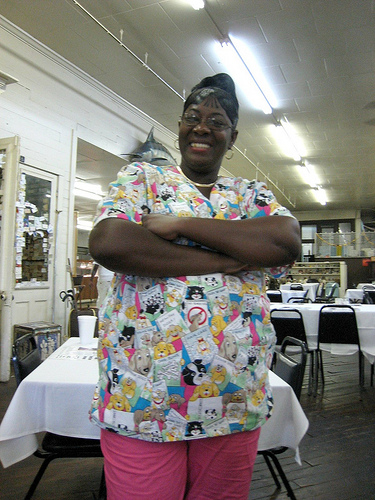
Again this year, 3.5 million people will experience homelessness in America. In the land of milk and honey, this is unconscionable.
Let’s examine the word homelessness for a moment. Who are the homeless? Well, clearly they come from all walks of life: homeless veterans, single women, women with children, people with mental health disorders, people with substance abuse problems, and the list goes on.
In January 2009, House the Homeless conducted a Health Survey of 501 people experiencing homelessness in Austin, Texas. Our survey showed that 48% of the people experiencing homelessness were so disabled that they could not work at a full-time job.
And in December 2007, another House the Homeless survey of 526 people experiencing homelessness showed that 37% of those surveyed were working at some point during the week, with 97% expressing a desire to work. In fact, we have come to understand that homelessness, for all its components, can be viewed in two major categories: those who can work and those who cannot work.
Reports from the last several U.S. Conferences of Mayors show that a person working full time, in a forty-hour-a-week, minimum-wage job, is unable to afford a basic, one-bedroom apartment, and remains homeless.
Who Are the Working Homeless?
They are the someone in our schools serving green beans and corn to our children in the cafeteria lines. They are the people in local dry cleaner operations pressing our suits and dresses. They are our janitorial staff cleaning our office buildings and urinals after we’ve gone to bed. They are the motel/hotel workers who change the sheets and clean up the trashed out rooms that we have left. They are the cashiers who cheerfully ask how they can help us.
They are our restaurant workers who work at below minimum wage ($2.13) and rely on us to (hopefully) boost their base pay with tips. They are poultry processors who work in our nation’s processing plants nationwide. They are farm workers who, even today, stoop behind the field machinery and continue to pick thorny cotton by hand.
They take our tickets in movie theaters, so we can see the next exciting 3-D movie. They are the healthcare aides in nursing homes who constantly turn over our loved ones to prevent bed sores. They do all the “dirty jobs” that you see on TV, and they flip our burgers at all the fast-food restaurants, and fold and refold the linen at every Wal-Mart.
And yet, the federal government continues to tell businesses nationwide that they only need to pay a minimum wage — not a living wage. A living wage would afford them basic food, clothing, and shelter. But as it is, nowhere in this country can receptionists, daycare aides, garage attendants, car washers, manicurists, grocery baggers, landscape workers, data entry workers, and elderly care aides afford the basics without a second job or relying on some outside support. That’s just wrong.
Who Should Pay?
Who should pay a wage sufficient to afford life’s most minimal necessities? Who profits from their labor if not business? Clearly it is businesses who benefit from their labor. So why are taxpayers footing the bill for food stamps when someone is working? Why do able-bodied individuals qualify for general assistance or the Earned Income Tax Credit, which is just another tax-sponsored program that would be unnecessary if businesses acted as responsible/ethical community partners?
If half these people who are homeless can work, why should you or I as taxpayers have to support them? I don’t want to. In fact, as a society, I’m not at all convinced that we could afford to support these millions of people indefinitely anyway. If a person is not disabled, then their homeless situation is really just an unmet economic need. This should be dealt with at the source: “A fair wage for a fair day’s work.”
When I was growing up, the saying was, “If you don’t work, you don’t eat.” I still believe in that postulate; however, that begs the question, if you work 40 hours in a week, shouldn’t you be able to afford the basics? If you work a full 40 hour week, shouldn’t you be able to afford a roof over your head (other than a bridge)?
I work in a homeless shelter. Every day I arrive to see hundreds and hundreds of people, half of whom are able-bodied. What they lack is opportunity.
There needs to be a spot on that shelter floor that I can point to and encourage people to get up off their chairs and go to that spot. It should be a spot that provides the big “O”: Opportunity. A spot where if they tuck their head down, lean into the wheel with their shoulder, apply themselves, they’ll know that, ultimately, they will be able to work themselves off the streets of America.
In other words, we simply need living-wage jobs. Then, as a compassionate taxpayer, I can get down to the work of helping people with disabilities. Perhaps in time, many of them will also be able to stand on that spot.
Take Action!
Tell President Obama that as he provides incentives for businesses to help in our economic recovery, he also needs to balance the equation by instituting the Universal Living Wage. Call the White House: 202-224-3121/1-800-459-1887, or email the President using the form at the White House website, http://www.whitehouse.gov/contact/.
Richard R. Troxell
House the Homeless, Inc.
National Chairman, Universal Living Wage Campaign
Source: “Mayors National Housing Forum Fact Sheet” (PDF), U.S. Conference of Mayors.
Image by schmuela (Karen Green), used under its Creative Commons license.
